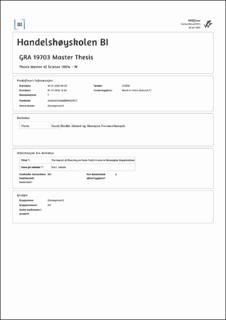| dc.description.abstract | RELEVANCE. Today, in a dynamic global market where cultural diversity predominates and people are seeking opportunities regardless of borders, diversity has become a part of the workplace across the world and will only have increased importance in the upcoming time. As a result, multicultural teams are becoming increasingly common in the workplace due to growing globalization. Hence, in the last century, researchers have examined different ways to improve the performance of multicultural teams in general. However, research is conducted by focusing on developed business environments, such as the USA, and small markets remain essentially unexplored. The scope of this study is therefore limited to Norwegian companies featuring multicultural teams since the company's inception, or over time.
GOAL. In this thesis, the goal is to examine how cultural diversity affects performance in teams where it is practiced, as well as investigate the effects on team performance.
RESULTS. The study is based on interpretivism and constructionism as its philosophical viewpoint. The empirical findings are conducted through a multiple case study design with semi-structured interviews, a well-known qualitative research method. The authors have investigated three organizations in Norway where cultural diversity is at the companies' core. Some of the findings are consistent with previous research. In contrast, different interesting results were observed by respondents in practice during the study in the Norwegian setting. Firstly, the authors analyzed the relationship between cultural diversity and team performance. It was found that the firms have a favorable view of cultural diversity, and to develop a competitive advantage, they need to embrace diversity and foster an open and flexible environment. In that sense, cultural diversity was advantageous in gaining differentiated perspectives for better solutions within teams, increasing innovation, creativity, and profitability. Emphasizing diversity management led to better team performance and cultivating an open attitude towards globalization. Although support was found for a positive impact of cultural diversity in teams for team performance, some challenges followed depending on the factors considered. Such as miscommunication, sick absence, and cultural disagreements. However, it was also discovered how the benefits of cultural diversity in teams could outweigh the challenges.
CONTRIBUTION. The authors hope this study can contribute to the understudied area of how cultural diversity affects team performance in Norwegian organizations and analyze why some organizations value cultural diversity and others do not.
Keywords: Cultural diversity, inclusion, multicultural teams, view on cultural diversity, effects of cultural diversity, managing cultural diversity, team performance | en_US |
